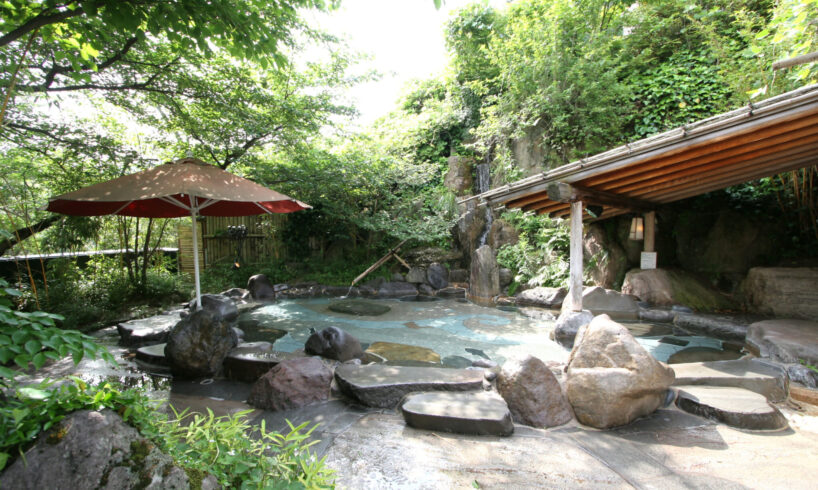
Fukuoka provides the ideal setting to experience one of Japan’s oldest and most cherished traditions: soaking in an onsen. Located on Kyushu, an island renowned for its volcanic activity and abundant groundwater, the prefecture is rich in geothermal resources. The result is a variety of hot springs with skin-soothing, mineral-rich waters.
Whether you’re gazing out at the sea, settled among forested hills or strolling through traditional townscapes, Fukuoka’s onsen have a true sense of presence in addition to a long list of good-for-you healing properties. Here are five standout onsen areas that highlight the region’s beauty, history and therapeutic appeal.
Harazuru Onsen: The Hot Spring of Double Beauty
Located on the northern bank of the Chikugo River, Harazuru Onsen is one of Fukuoka’s largest and most celebrated onsen towns. With 10 different ryokan inns, it offers a range of accommodation options, ranging from traditional to modern.
What sets Harazuru apart is its rare blend of alkaline and sulfur springs, a combination that has earned it the nickname “The Hot Spring of Double Beauty.” Its transparent, slightly slippery waters are beloved for their skin-polishing effects, drawing visitors eager to relax and emerge with a radiant glow.
Beyond the baths, there are a variety of local pleasures to be found around Harazuru, including fruit picking and pottery — all in a tranquil riverside setting that encourages slow, scenic strolls. With easy access from Fukuoka’s metropolitan area, the town is well loved by locals and travelers alike.
Wakita Onsen: Nature’s Gift for Wanderers
Set between Kitakyushu and Hakata, Wakita Onsen is a hot spring village known for its natural beauty with a history dating back to the Nara period. Though lesser-known, it remains a hidden gem for those willing to wander off the beaten path.
Wakita is stunning in every season: cherry blossoms in spring, fireflies dancing through summer nights, fiery foliage in autumn and an ethereal sea-of-clouds phenomenon in winter. With fewer crowds than you’ll find at larger resorts, Wakita offers an almost meditative escape into one of Fukuoka’s most peaceful corners.
Futsukaichi Onsen: A Gateway to History and Healing
With a legacy stretching back over 1,300 years, Futsukaichi Onsen is one of Fukuoka’s most historically significant hot springs. As it’s located conveniently near the Kyushu National Museum and the famed Dazaifu Tenmangu Shrine, many visitors opt for a healing bath between visits to some of Fukuoka’s most popular sightseeing spots.
Among famous historic visitors to the springs is Otomo-no-Tabito, a court noble and poet, who mentions Suita Onsen (modern-day Futsukaichi) in a poem that appears in the Manyoshu, the oldest anthology of Japanese poetry.
Chikugogawa Onsen: A Riverside Retreat With Local Flavor
Set along the Chikugo River, Chikugogawa Onsen makes full use of its abundant natural gifts — not just its mineral-rich hot springs, but also the fertile land that surrounds it. The nearby Ukiha region is one of Fukuoka’s top fruit-producing areas, meaning that you can pair seasonal fruit-picking with your relaxing soak.
The streets of the nearby white-walled town are lined with independent shops selling everything from handmade crafts to local sweets.
Funagoya Onsen: A Hot Spring Loved by Legends
Located along the Yabe River, Funagoya Onsen has been renowned since the Meiji era for its unique carbonated waters, which have an unusually high amount of iron. Local bathers have long spoken of the therapeutic properties of its hot springs; its waters are thought to help with muscle and joint pain, skin injuries and even anemia.
Funagoya has a long list of famous visitors throughout its history, including novelist Natsume Soseki, who visited with his wife shortly after their marriage, as well as Emperor Showa, who stayed there in 1949. Given its legendary history, visitors may feel inclined to comment on the beauty of the moon after their refreshing soak.
More Info
To learn more about Fukuoka’s hot springs, click here.
A Taste of Fukuoka in the Heart of Tokyo
For a taste of Fukuoka’s distinctive culture in the heart of Tokyo, Kojimachi Nadaman Fukuoka Bettei offers an exceptional dining experience, featuring traditional cuisine made with seasonal ingredients sourced directly from the prefecture.
Kojimachi Nadaman Fukuoka Bettei
1-12-1 Kojimachi, Chiyoda city, Tokyo
To make a reservation, visit their website or call 03-6380-8421.





